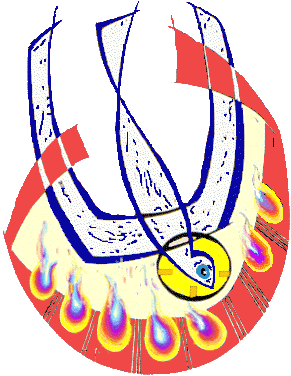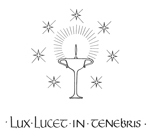
Part Two: Channels of Grace
The Sacraments
 The closing article of the Apostles’ Creed, “I believe in
life everlasting,” is also the opening door to the seven sacraments instituted
by Jesus Christ.
The closing article of the Apostles’ Creed, “I believe in
life everlasting,” is also the opening door to the seven sacraments instituted
by Jesus Christ.
As we have seen, the eternal life that awaits those who believe in Christ is the supernatural life which He came into the world to restore to a fallen human race. That is why the Savior was so blunt in His explanation to Nicodemus about the need for being “born again”. I tell you most solemnly, unless a man is born through water and the Spirit he cannot enter the kingdom of God. What is born of the flesh is flesh. What is born of the Spirit is spirit. Do not be surprised when I say: You must be born from above (John 3:5-7). There are, therefore, two forms of birth because there are two levels of life. We acquire the natural life because we are born “out of human stock,” and the “urge of the flesh, and the will of man.” But there is a higher life whereby a person is born “of God Himself” (John 1:12-13). The sacraments of the Catholic Church have all their meaning contained in this mystery of faith. The same Christ who said, “I have come that they may have life and have it to the full” (John 10:10), is the one who provided the principal means for obtaining, regaining and growing in this life – by instituting the sacraments of the New Law.
Channels of Divine GraceBefore we look into each of the sacraments, we should see more deeply what the Church understands by the supernatural life. In a word, by the supernatural life the Catholic Church understands the life of grace. And grace is the supernatural gift that God, of His free benevolence, bestows on human beings for their eternal salvation. The gifts of grace are essentially supernatural. They surpass the being, powers, and claims of created nature. The variety of these gifts is beyond number, but they are ordinarily classified as sanctifying grace, the infused virtues, the gifts of the Holy Spirit, permanent character, and actual graces. All of these gifts are somehow received, restored, or increased by the sacraments of Jesus Christ. Sanctifying Grace. The most fruitful term in revelation for sanctifying grace is simply “life.” In the original Greek of the New Testament, it is regularly called zoe, in preference to two other words for “life” in Greek, namely, bios and psyche. The New Testament understands zoe to mean the supernatural life that God communicates to us through Christ. Most often, the combination zoe aionios, eternal life, is found in the gospels and St. Paul. Yet the same zoe that we possess on earth as divine grace will continue in eternity as heavenly glory. This is the divine life that was in the Word from the beginning and “from His fullness we have, all of us, received – yes, grace in return for grace” (John 1:16). In technical language, we may say that the divine indwelling in the souls of the just is the Uncreated Grace of the Holy Trinity. The created effect of this indwelling is sanctifying grace. St. Augustine speaks of sanctifying grace as the “soul of the soul.” he means that our body has the soul as its source (or principle) of natural life. So our soul has it source of supernatural life, which is sanctifying grace. Thus sanctifying grace is a divine quality inhering in the soul. From this follows a number of wonderful effects.
Infused Virtue. It is the infallible teaching of the Church that the virtues of faith, hope, and charity are conferred along with sanctifying grace. These virtues are received in the soul as permanent habits or dispositions. The Church says they are infused. This is to make clear that they are not acquired, as are other habits, by repetition of an act. They must be, as it were, directly “poured in” (infundere) by God. The virtue of faith enables us to assent with our minds to everything which God has revealed. Our motive for accepting God’s revelation is His own divine authority. We believe because He is all-knowing and therefore cannot be deceived, and all good, and therefore would not deceive us. When He tells us something we accept His word as infallibly true. The virtue of hope belongs to the will. It makes a person desire eternal life, which is the heavenly vision of God, and gives one the confidence of receiving the grace necessary to reach heaven. The grounds of hope are God’s almighty power, His infinite goodness, and His fidelity to what He promised. The virtue of charity enables us to love God for His own sake and to love others out of love for God. Like hope, charity resides in the human will. But unlike hope, charity is selfless love. When we hope, we also love God, but we love Him because of the reward we justly expect of Him – grace in this life and eternal glory in the life to come. But charity is different than hope. The English word “love” does not fully express what we mean by charity. Love may be natural or supernatural. Charity is uniquely supernatural. Love is often equated with “like,” which implies a natural attraction. Charity may be practiced even in the absence of such spontaneous appeal. Love commonly involves our internal emotions and usually implies a depth of feeling. Charity does not exclude emotions or feelings, but, in essence charity, is a virtue of the free will. It goes out to the object which we love, either God or our neighbor, in order to please the one who is loved. The virtues of faith, hope, and charity are called theological because their immediate object is God (Theos in Greek). They are directed to Him. We believe in Him who is the Truth, we hope in Him who is the Way, and we love Him who is the Life. But there are four other virtues that are called moral because their immediate object is human behavior (from the Latin mores, meaning fixed, morally binding customs). They are also called cardinal virtues (from the Latin cardo, hinge) because they are like hinges on which all the moral virtues depend. There are four basic moral virtues, namely prudence in the intellect, and justice, fortitude, and temperance in the will. It is the Church’s common teaching that, along with the theological virtues the moral virtues are also infused into the soul with sanctifying grace. Gifts of the Holy Spirit. Along with the infused virtues, a person who receives sanctifying grace also receives the seven gifts of the Holy Spirit. They are seven forms of supernatural instincts or initiatives which prompt a person to respond to the divine movements of grace. 
The gifts are like reflexes that enable a person to spontaneously answer to the impulses of God’s grace. Their scriptural basis is the prophetic endowment of the Messiah. The spirit of the Lord shall rest upon Him, the spirit of wisdom, and of understanding, the spirit of counsel and of fortitude, the spirit of knowledge and of godliness. And He shall be filled with the spirit of the fear of the Lord (Isaiah 11:2-3). Although directly attributed to the Messiah these gifts are implicitly the common possession of all Christians, whose very name signifies “Messianists” (Mashiah, Hebrew for Anointed, which in Greek is Christos). Four of the gifts of the Holy Spirit belong to the intellect – wisdom understanding, knowledge, and counsel; and three to the will – fortitude, piety, and fear of the Lord. They are different from the virtues in that they prompt the virtues into action and, when faithfully responded to, enable a person to perform extraordinary, even heroic, deeds after the example of Jesus Christ. Permanent Character. Three of the sacraments confer an indelible character on the soul. Thus Baptism, Confirmation and Holy Orders imprint a permanent, supernatural quality on the person, which differs for each of these sacraments. But they have one effect in common: They assimilate a person to the priesthood of Christ in a special way. The sacramental character is indelible. This means that it remains in a person who may have lost sanctifying grace or even the virtue of faith. The sacramental character is called a character because it permanently seals the person with a supernatural quality, similar (though on a higher level) to the character that identifies each individual as a distinct personality. Moreover, it is called a character because it permanently gives the one who receives it certain powers that no one else possesses. In philosophical terms, the sacramental character changes the one who receives it in his very being. Persons baptized, confirmed, or ordained are forever new beings. They have a unique relationship to Christ that no one else has, and they are empowered to do things that no one else can perform. Logically, too, the sacramental character is conferred only once. Consequently the sacraments which bestow the character can never be repeated. A person remains baptized, confirmed, and ordained into eternity. Actual Graces. The best way to understand the meaning of actual graces is to compare them with God’s constant influence on our created nature. Just as we could not use our natural powers without continued divine support, so we need the help of His grace to retain or grow in the supernatural life of God. Actual graces therefore are temporary influences from God that enlighten our minds and inspire our wills to perform supernatural actions that lead to heaven. One of the great blessings of the sacraments is that they are the richest source of actual graces available to mankind. It is mainly though the sacraments that God provides His people with the holy thoughts and holy desires they need to enable them to reach heaven. Each sacrament has its own treasury of actual graces available to those who receive the sacraments. Moreover, as we shall see, the Holy Eucharist as a Sacrifice and a Presence sacrament mysteriously supplies graces even to those who are not Christian believers or may be sinners totally estranged from God.
What are the Sacraments?We may define a sacrament as a visible sign instituted by Christ which effectively communicates the grace it signifies. Each of the seven sacraments is something visible or sensibly perceptible. The water poured in Baptism, the oil used in Confirmation, the bread and wine for the Eucharist, along with the words pronounced and the ritual seen, are all perceptible to the senses. The sacraments are not only perceived by the senses: They are also signs which signify. They manifest something beyond the visible ritual performed. Thus water signifies washing, oil signifies strengthening or healing, eating and drinking signify being nourished. In each case the external sign signifies some internal change taking place in the human spirit. And always this change is in the supernatural order, including some area or aspect of divine grace. But the sacraments are not merely signs that grace is received. No, the heart of the sacraments is that they actually produce the grace which they signify. They are like instruments in the hands of Christ who, through them, confers the graces proper to each sacrament. Over the centuries the Catholic Church has had to defend the fact that Christ Himself instituted all seven sacraments. He did so personally and immediately. He determined the substance of each sacrament; its essential ritual and content; who is empowered to confer the sacraments, and on whom they may be conferred; what material is to be used; and essentially how each sacrament is to be an effective sign of grace. As Catholics, we recognize two sources of divine revelation, Sacred Scripture and Sacred Tradition. Consequently we do not expect to find explicit evidence in the Bible for Christ’s institution of all the sacraments. No matter. The Church teaches infallibly that “the sacraments of the New Law were all instituted by Christ,” that “these same sacraments of the New Law differ from the sacraments of the Old Law” and that “there are neither more than seven nor fewer than seven sacraments” (Council of Trent, March 3, 1547). How necessary are the sacraments? They are necessary for salvation, even if not all are necessary for each individual. The actual reception of a sacrament can, in case of necessity, be replaced by at least the implicit desire for the sacrament. The Second Vatican Council declared that Christ established the Church “as the universal sacrament of salvation” (Constitution on the Church, VII). Among other things, this means that the sacraments of the Church are somehow necessary for the salvation of the world. Absolutely speaking, God, who is almighty and perfectly free, could have chosen to confer grace without the sacraments. Why then, did He choose to dispense His grace through the sacraments? He did so in order that the mysterious effects of His infinite power should be made intelligible by means of certain signs that are evident to or senses. If we were disembodied spirits, God might have dispensed His graces directly, without the use of material things. But since we are creatures of body and soul, God chose to use bodily means to confer His spiritual blessings on our souls. Christ instituted the sacraments because He knew how much we depend on external, visible signs to sustain our faith in His promises. Moreover, the sacraments are a continuation of Christ’s work of redemption. They are the link, as it were, between His Passion on Calvary and our present needs on earth. They are the channels by which His saving merits are now conveyed to a sinful world. The sacraments provide a marvelous bond of visible unity among the members of Christ’s Church. They distinguish the followers of Christ from all others, while those who belong to the Mystical Body are thus joined together by a sacred bond. By means of the sacraments we make a public profession of our faith, and others witness to what we profess to believe. In this way our faith is strengthened by its external profession and our charity is deepened by sharing with others, and they with us, the sacred mysteries of Christianity. Finally the sacraments afford us a constant check on our pride. They encourage us to the practice of humility by making us submit to material things as a condition for obtaining the graces that we need for the spiritual life. 
Copyright © 2002 Inter Mirifica
Pocket Catholic Catechism |